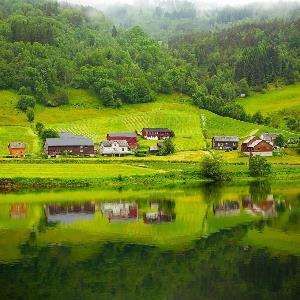

With its unique biorefinery concept Borregaard turns wood into bio chemicals, bio materials and specialty products based on natural, sustainable raw materials.
Borregaard has been using sustainable processes to produce vanillin from wood since 1962 . Today the Norwegian firm is the only company in the world producing vanillin from wood and it manufactures a total of 1,500 tonnes every year.
It takes 1,000 kilos of wood to produce three kilos of vanillin. But vanillin is only one of several products derived from the biomass. The integrated process also creates products such as advanced bio chemicals, second generation bio ethanol and specialty cellulose.
“We utilise more than 90 per cent of our biomass compared to the three per cent used for vanillin produced from beans. We are using a resource that can be regrown,” says Borregaard Vanillin’s business director Thomas Marwedel. “In addition, a Life-Cycle Assessment shows our vanillin has a 90% smaller CO2-footprint compared to mineral oil-based vanillin.”
The wood sourced by Borregaard is Forest Stewardship Council-certified or similar. All the water used in the process is drawn from a nearby river and processed through Borregaard’s in-house water system. The energy supply is based on hydro-power and utilises the balance from the biomass.
The company has enjoyed international recognition for its sustainable approach to production including Technoport’s 2011 award for innovative environmental technology. It has also received funding for a pilot plant to produce ethanol from different crop-sources.
But what about the quality of the vanillin produced? “EuroVanillin Supreme, which is the brand name of vanillin from wood, exceeds specifications and is more than 99.6% pure and meets all relevant requirements in fragrance and food,” says Marwedel. “EuroVanillin Supreme is also well known for its higher intensity and smoother note.”
Out of 730 staff, Borregaard employs 70 people in research and development while 25 per cent of the company’s revenues come from new products. “International demand is growing. Consumers are insisting on more sustainably produced products and international bodies are demanding greener approaches to industry,” says Marwedel.
ACDV, the non-profit French Bio-Based Chemistry Association, for example, has stated that 20 per cent of France’s chemical production should be derived from renewable sources by 2020 and the European Environment Agency is focusing its attention on making Europe a centre for ‘green economy’.
The United Nations Environment Programme, meanwhile, is increasing its focus on improved sustainable consumption and production worldwide and the EU is placing emphasis on replacing chemicals produced from oil.
“Vanillin is one of the most valuable products we make from wood and we are producing more than ever before,” said Borregaard AS’s CEO Per A. Sørlie at the 50-year anniversary of the company’s vanillin plant in 2012.
“We have shown that our products from renewable raw materials are good alternatives to petroleum-based products and we’re proud of the knowledge and experience that has made us truly unique in an international context.”
